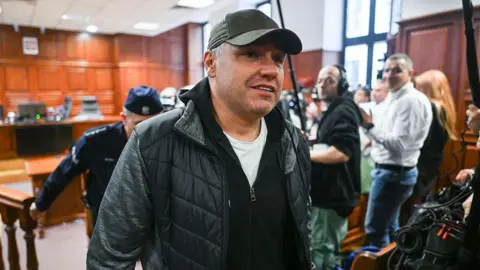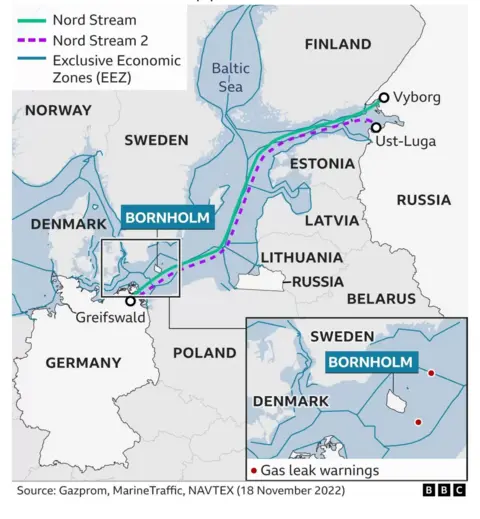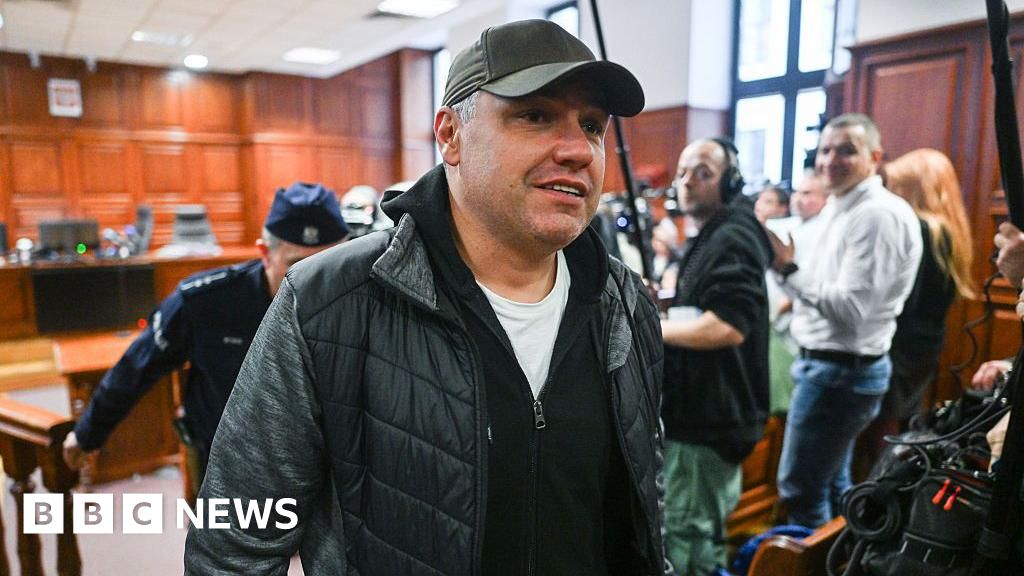Sarah RainsfordSouthern and Eastern Europe correspondent in Warsaw
 Omar Marques/Getty Images
Omar Marques/Getty ImagesA Polish judge has refused to extradite a Ukrainian citizen – suspected by Germany of sabotaging the Nord Stream gas pipelines in September 2022 – arguing that if Ukraine was responsible for the attack, then it was a “just” act.
Volodymyr Zhuravlyov, who was brought to Warsaw District Court in handcuffs, was detained in Poland last month on a European arrest warrant.
Judge Dariusz Lubowski ordered his release, after a ruling that was met with a ripple of surprise from the crowd in court and a smile from the man in the dock.
Mr Zhuravlyov, along with others, is suspected of planting explosives deep beneath the Baltic Sea on the pipelines leading from Russia to Germany.
Blame for the blasts, which crippled a long-controversial energy supply line from Russia to Germany, initially focused on Moscow until signs of Ukrainian involvement began to emerge.
Officials in Kyiv have repeatedly denied any role.
Extradition cases within the EU are usually quick and straightforward, but the Nord Stream case is proving to be very different.
Polish Prime Minister Donald Tusk, whose government is a key ally of war-torn Ukraine, immediately posted on X that the ruling was right.
“Case closed,” he wrote.
Inside the giant district courthouse in Warsaw, Judge Lubowski announced his decision to the suspect, his family and legal team – and a large cluster of TV cameras.
In a long and passionate speech, he said he was considering only the request to send Mr Zhuravlyov to Germany, not the substance of the case itself. But he was clear that the context of the war in Ukraine was critical.
The judge described Russia’s invasion as “a bloody and genocidal attack” and argued, quoting Aristotle and Saint Thomas Aquinas, saying that Ukraine had the legal right to defend itself.
“If Ukraine and its special forces… organised an armed mission to destroy enemy pipelines – which the court does not prejudge – then these actions were not unlawful.
“On the contrary, they were justified, rational and just,” he told the court.
 BBC/Sarah Rainsford
BBC/Sarah RainsfordHe said the attack had “deprived the enemy of billions of euros paid by Germany for the gas… and weakened Russia’s military potential”.
What could be seen as terrorism or sabotage in peace time, the judge said, was different in a time of war.
Germany had in fact halted use of the two Nord Stream 1 pipelines after Russia’s full-scale invasion of Ukraine and Nord Stream 2 had not yet entered service.
Poland has always been a vocal critic of that project for making Berlin too dependent on Moscow. The route deprived Poland of transit fees for the gas. Ukraine and the US were also longstanding opponents of the pipelines.
Judge Lubowski insisted, though, that his ruling was a legal one, and not emotional or political.
He also questioned whether Germany had jurisdiction even to bring its case, as the explosions were in international waters on pipelines with majority Russian state ownership.

Announcing that Mr Zhuravlyov would be released from custody, he said the Ukrainian would also get compensation from the Polish state.
“I am happy… it was a really very hard three weeks,” Mr Zhuravlyov’s wife, Yulianna, told the BBC in court after the judge’s verdict.
“For me, as a Ukrainian, it was very important to hear that he understands us.”
She said the family planned to stay in Poland, where they have lived since February 2022.
Earlier, she described her husband’s arrest at their home just outside Warsaw and said he denied any involvement in the sabotage.
Volodymyr Zhuravlyov is a deep-sea diver, his wife has confirmed, but she called it a hobby and said he had no military role.
He has a business in Poland installing air conditioners. Mrs Zhuravlyova could not tell the BBC exactly where her husband was when three of the four Nord Stream pipelines were blown up, because she said no-one had asked her to check.
He is not the only suspect on Germany’s list: another Ukrainian man was detained in Italy in August when he was on holiday.
Serhiy Kuznetsov was also accused of “unconstitutional sabotage” and has denied any connection to the blasts. He is currently in a high security prison in northern Italy.
A court in Bologna did rule he should be extradited to Berlin but earlier this week that verdict was annulled by the top appeals court in Rome and the case has been returned to Bologna to begin all over again.
Asked about the decision, Germany’s foreign minister said he respected the ruling and it was not the job of government to interfere with the courts.











